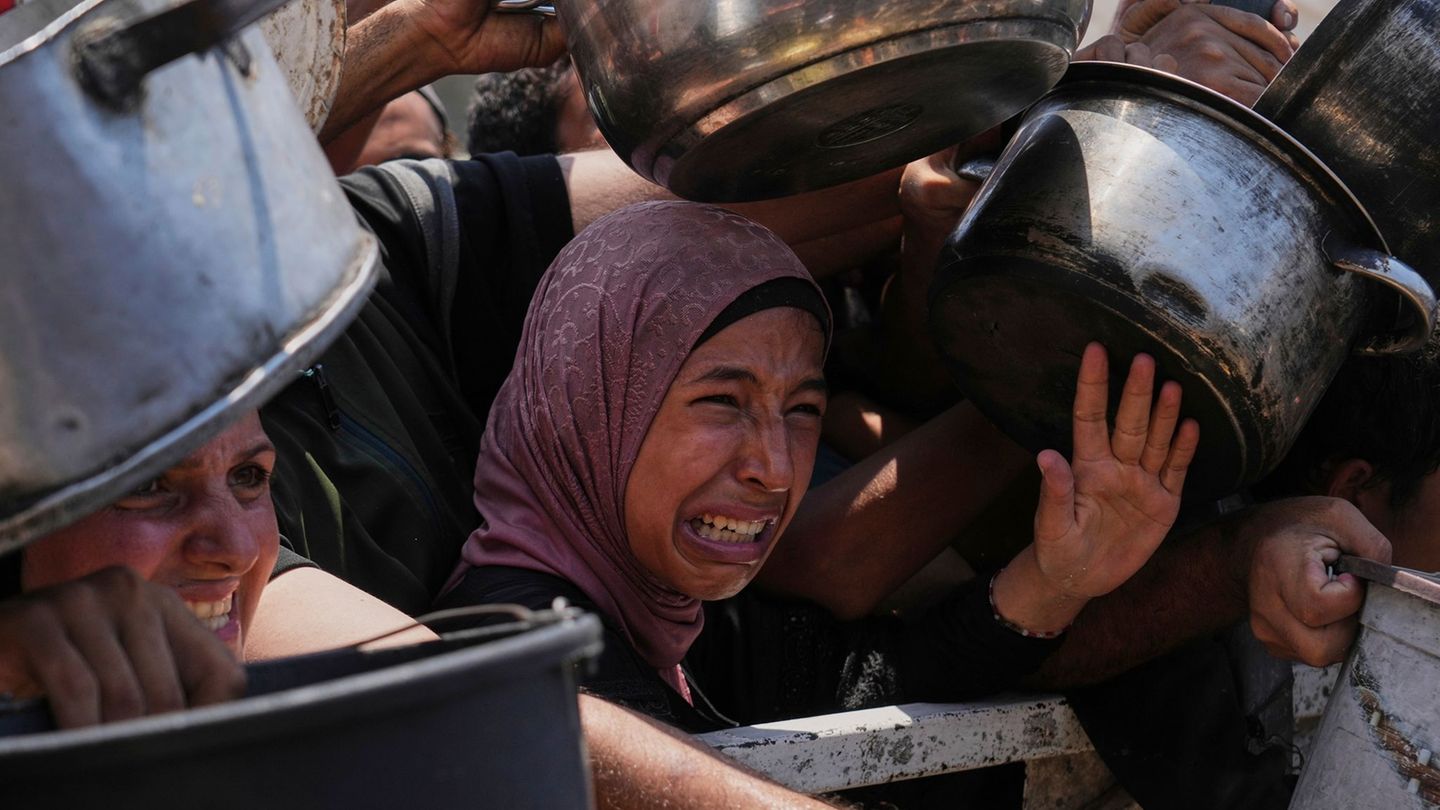Gaza war
HONERNOT in Gaza? This is what the official criteria say
Copy the current link
Add to the memorial list
Since March, only occasionally aid deliveries have been in the Gaza Strip. Helpers accuse Israel of targeting the population. Israel denies this. When does one speak of a famine?
Experts are emphasizing about a famine in the Gaza Strip. Since March, Israel has only occasionally left aid deliveries into the coastal area. Since then, the humanitarian situation has come to a head. Questions and answers to what that means:
A “famine” is a rare and extremely dramatic event. Your proclamation is based on strictly defined criteria. These are defined by experts from the IPC initiative (Integrated Food Security Phase Classification) founded in 2004 with a main office in Rome. The criteria are internationally recognized and apply to the analysis and evaluation of food crises in countries worldwide.
In the IPC scale there are five levels of the nutritional situation in a country or region. The highest – and worst – is level 5: “disaster/famine”. Below is about hunger crises.
When will a famine be proclaimed?
For the classification as a famine (“Famine with Solid Evidence”), three criteria must be met at the same time:
At least 20 percent of the households of a region are affected by an extreme lack of food; At least 30 percent of children suffer from acute malnutrition; Every day, at least two adults or four children die from hunger per 10,000 inhabitants or due to the interaction of malnutrition and illness.
If independent data collection is not possible or only possible, a region can also be explained for a region with sufficient evidence (“Famine with Reasonable Evidence”). Clear information is met for two of the three categories mentioned above; For the third party, analysts use information due to the total location.
An example of this is the Gaza Strip: The UN Food and Agricultural Organization (FAO) has eleven employees on site who provide support for every IPC collection. Nevertheless, due to the limited access options and the authorities controlled by the Hamas, comprehensive data are currently missing.
Who officially calls out a famine?
Basically, the IPC experts create the technical assessment. The official proclamation is “responsible for the government and the state itself or by authorized institutions” such as UN representatives, explains a senior faith representative, Abdulhakim Rajab Elwaer, the German press agency.
The so -called Famine Review Committee is between the IPC and a possible official declaration of a famine. It consists of independent experts who are called to check the data and assessments of the IPC. On this basis you can make a recommendation. UN representatives, for example, can then publicly call out a famine-even if affected governments often do not recognize this, as Elwaer says.
Why is a famine not always explained immediately?
Usually because it does not start suddenly, but often worsens itself for months – and that under conditions that make a formal classification difficult. A special feature of the IPC reports is that they make a trend visible because they appear at regular intervals, explains Elwaer. So you can observe whether the situation improves or further intensifies.
In addition, it is often extremely difficult in war zones to collect reliable data on mortality or health, which makes it difficult to check the situation. In some cases, states or parties to the conflict also try to play a hunger crisis to avoid criticism or consequences.
When was a famine recently proclaimed?
According to the IPC, four famines have been confirmed in the past 15 years: 2011 in Somalia, 2017 and 2020 in South Sudan and most recently in Sudan in 2024.
In 2011, more than 250,000 people died in parts of Somalias. The areas were dominated by the Islamist militia al-Shabab, which only allowed auxiliary performances to a limited extent. In southern Sudan, a long -term conflict and economic decay led to the emergency that only affected some regions in 2017, the entire country in 2020. At the famine in the civil war country Sudan 2024, the experts demonstrated the criteria of famine in at least five areas.
Why has no famine be explained for the Gaza Strip?
Level four on the IPC scale (“Emergency/Emergency”) currently applies to the entire Gaza strip. Among other things, this means that according to IPC assessment, many affected households do not have enough to eat. This is reflected in very high acute malnutrition and excessive mortality. According to the IPC, emergency aid with food deliveries is necessary in this phase so that people do not die from malnutrition.
As already described above, phase five presupposes an extreme lack of food, acute malnutrition and a certain number of hunger -related deaths. The IPC experts warned this week that the first two criteria are already being met, at least in parts of the Gaza Strip – extreme lack of food practically in most parts of the gaza strip and acute malnutrition in Gaza city.
There is also a negative trend in the sealed coastal area: the overall situation of the population has deteriorated between the IPC reports from December, May and the current.
In concrete terms, according to the IPC, this means currently: 39 percent of the residents sometimes have to make do without a single meal for several days. More than half a million people, almost a quarter of the population, are already experiencing “famine-like conditions.” From the Famine Review Committee it says: “Without quick and concerted measures, famine is inevitable.”
How neutral is IPC’s assessment?
IPC is an international initiative in which governments, UN organizations such as the FAO, the Kinderhilfswerk UNICEF and the World Food Program (WFP) as well as NGOs and other partners work together to reliably assess nutritional crises.
Local teams collect data on nutrition, prices or health in the countries concerned. These flow into standardized IPC models. National IPC working groups, consisting of government officials, UN agencies, NGOs and scientists, then analyze the location and carry out classification.
If a country may have reached phase five, i.e. a famine, the Famine Review Committee (FRC), a group of high -ranking, neutral experts in nutrition and statistics, finally checks this data for technical accuracy and neutrality of the analysis before the results are confirmed and communicated.
Has Israel already criticized the IPC in the past?
Yes, for example on the occasion of a previous IPC report in May this year, which also underlined the risk of impending famine. The Israeli military authority of Cogat, which approves (or blocked) the auxiliary deliveries in the Gaza Strip, wrote in a statement at the time: “Even from his own analysis of the IPC, it can be seen that there is no famine in the Gaza strip. The term” impending famine “is misleading because it refers to future scenarios, which the IPC predicts, but which has been forecast, but The start of the war repeated not to step in. “
What does Israel see in the Gaza Strip?
Prime Minister Benjamin Netanyahu recently said: “There is no policy of starving in the Gaza Strip, and there is no hunger in the Gaza Strip.” Other Israeli politicians also always emphasize that there is no famine in the sealed coastal strip.
After increasing international criticism in the face of the dramatic supply situation in the Gaza Strip, Israel has been leaving larger aid deliveries on the country path into the coastal area since Sunday and also allows drops out of the air.
What does the official proclamation of a famine bring?
On the one hand, this has a psychological effect. Some governments and organizations only really take action when there is an official explanation – although the signs have long been there. This releases more funds to support. It was similar in Corona pandemic: Although the situation became increasingly critical in early 2020, many countries only went to crisis mode when the World Health Organization (WHO) officially spoke of a pandemic.
The FAO representative emphasizes that a formal proclamation is “extremely necessary”. Such an explanation of governments is often avoided in man -made crises because it in fact evidence that the famine was not nature -related but politically caused. That makes those responsible. “It is a direct accusation,” said Elwaer.
According to Elwaer, an official proclamation by the IPC partners is a joint judgment of the international community. It can also serve as the basis for steps of the International Court of Justice, the UN Security Council or individual countries – for example for sanctions or political pressure.
dpa
Source: Stern
I have been working in the news industry for over 6 years, first as a reporter and now as an editor. I have covered politics extensively, and my work has appeared in major newspapers and online news outlets around the world. In addition to my writing, I also contribute regularly to 24 Hours World.




